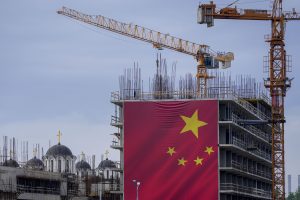Since China unveiled its plans to include Eastern Europe in the Belt and Road Initiative in 2014, the Western Balkans have become a focal point for investment ventures aimed at upgrading infrastructure, enhancing energy accessibility, and creating employment opportunities. However, the reception to these investments has been far from warm, with many projects provoking prolonged legal disputes and public backlash.
Serbia, the Balkan nation that has the biggest appetite for the expensive and polluting infrastructure projects that China has offered, just celebrated Xi Jinping’s visit to Belgrade with a grand headline in a pro-government newspaper that reads: “May the Light of Our Ironclad Friendship Shine on the Path of China-Serbia Cooperation.” This succinctly summarizes the official narrative regarding a decade of Chinese investments in the country, while the two sides agreed that several billion euro worth of new investment deals will follow.
Our research shows a rapidly growing public discontent with this official portrait of friendship. We have identified over 52 criminal complaints or protests against Chinese funded projects in Serbia since 2014. Among other things they include accusations of illegal displacement of villagers, illegal demolition of a mountain peak, breaching workers’ rights, and constructing large-scale mines without a working permit or environment impact assessment studies.
Across the region, the reality of China’s investments begs to tell a different story. Just Finance International mapping has identified over 100 cases of protests and criminal complaints in response to the impacts of Chinese investments in Serbia, Montenegro, Bosnia and Herzegovina, North Macedonia, and Albania between 2014 and 2024. These cases raise fundamental questions about the legality of Chinese investments that, according to local affected populations, have perpetuated environmental degradation, human rights violations, and transparency problems.
Our research underscores the significant environmental, social, and climatic costs incurred by China’s relentless expansion into the Western Balkans. In several instances, political ambitions have apparently negated national laws in favor of economic growth targets, with construction commencing before numerous legal requirements – public tenders, spatial or relocation plans, and environmental impact assessments – were met.
This disregard for legal protocols in pursuit of these development projects has severely impacted the wellbeing and livelihoods of communities across the region. Among other issues, locals have been exposed to air pollution that exceeds national levels, and farmers have been subject to land confiscation without compensation.
The legal quagmire surrounding these investments is deep and complex, with the outcomes of court cases uncertain and the costs of protracted legal battles – some dragging on for years – mounting for all parties involved. However, the sheer volume of criminal complaints emphasizes the deeply contentious nature of many investments and the growing discontent within affected communities.
Compounding these challenges are reports that Asian laborers – brought to the Western Balkans by the Chinese investors – have protested against a number of issues, including substandard working and living conditions and inadequate payments. An unsettling case of suspected forced labor in the construction of the LingLong tire factory in Zrenjanin, Serbia, illustrates the human toll of unchecked economic expansion, and further highlights the ethical dilemmas inherent in these investments.
































